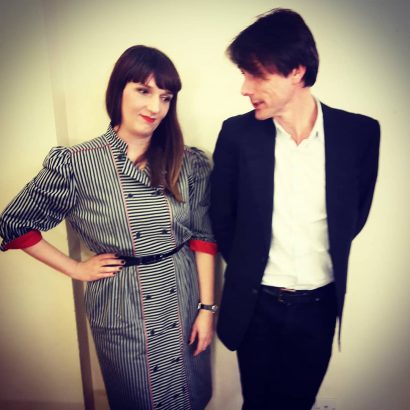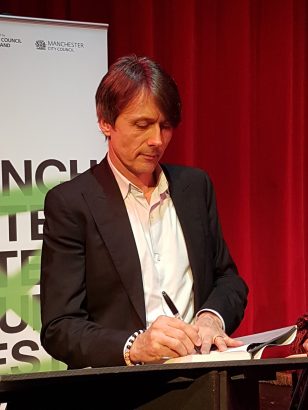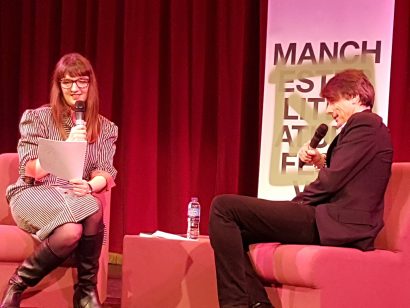 MLF Chapter & Verse
MLF Chapter & Verse
The Manchester Literature Festival Blog
‘Between bestiality and boredom’: Brett Anderson In Conversation
The Dancehouse is packed with over 400 fans. We’re here to see Brett Anderson, lead singer of Suede, talk about his memoir Coal Black Mornings. He’s interviewed by Adelle Stripe, author of Black Teeth and a Brilliant Smile, who’s also a huge fan of the band and Brett.
Adelle begins by asking him about his university days in Manchester. Brett says when he was young, he wanted to move away from Haywards Heath and the music scene in Manchester called to him. He was soon part of it, in a way. Brett recalls his days working as a DJ at the Cyprus Tavern, which used to be on Princess Street. Events there inspired the song ‘Killing of a Flash Boy’. He says he saw the job advertised in the job centre and pretended he had experience as a DJ in order to get it. There were often fights in the venue and the DJ was supposed to stop the music to alert the bouncers. However, Brett was ‘so crap’ at being a DJ there were often gaps between songs which set the bouncers running to the dancefloor looking for the fight. One night, he was walking home in the early hours when some men who’d been at the venue decided to follow him. He ended up jumping in to one of the industrial bins outside a school while the men raged in the street. Adelle asks Brett what his DJ name was. He tells her she’s getting the wrong idea, he wasn’t that type of DJ.
Adelle moves on to the writing of the book. Where did it come from? ‘Little, Brown. They’re a publisher. Have you heard of them?’ It’s the first of a number of moments that highlights Brett’s sense of humour. It becomes clear as the evening unfolds that he’s very funny indeed.
Brett clarifies that Adelle’s asking about the genesis of the book and says he began writing it after his son was born. He started thinking about legacy and wanted to leave a document for his son. He wasn’t thinking about publication at that point. He says he thinks the sense of family in the book is quite strong. ‘It was a way of giving [my parents] life beyond death’. He talks about how things are fictionalised ‘to a certain extent’ when you write a memoir. ‘I definitely did it with my father. I wanted to give him flamboyance. It’s how I remember him. He was born in the wrong class, in the wrong time. He should’ve been Wagner’s son.’
When he began writing, Brett says he made a conscious decision to go against the typical rock autobiography, although he says he used to enjoy reading them when Suede was on tour. He quotes Viv Albertine saying anyone who writes a memoir is either ‘a prat or broke’ (although that’s a much milder word than the one Albertine uses!) but does confess to enjoying Just Kids by Patti Smith. He says Cider with Rosie by Laurie Lee was a model for Coal Black Mornings. Brett likes the way Lee uses language to decide ordinary things. After the decision to write about the early years, rather than the height of Suede, he knew he needed to write more lyrically. He says he found his schoolboy diaries, thinking he could use them, but they’re ‘really really boring. Double History. It was rainy. Shepherd’s pie for tea’.
The book was mostly written on the train travelling to London and back. He says initially the book was half the length it is now. Feedback from publishers was that the book was too short. They wanted Brett to carry on and write about the fame he and Suede experienced. Little, Brown suggested instead that he flesh it out by writing more about the songs. He liked this idea, having seen it done in the Paul McCartney biography Many Years From Now.
Adelle asks whether London still holds a fascination for Brett. He says he finds London to be an amazing muse even though some things about it are horrible. He quotes a lyric from ‘He’s Dead’ to exemplify his

Photograph by Benjamin Myers
feelings for the city: with all the love and poison of London. He expands on this by saying, ‘It’s like your family. You have to accept it. It’s so poisonous and dirty and depressing but it’s so beautiful’.
The discussion moves on to writing about England and Englishness. Brett said when Suede started doing that in 1990/1 it felt like an exciting thing to do. That was before it was ‘sullied by Britpop’. On the bands that became famous under that banner, Brett says, ‘I was documenting Britain and they were celebrating Britain’. He says he doesn’t think Suede is accepted like other bands from the same era. ‘And I quite like that.’
Is performing a strange life? ‘It’s a bizarre experience between bestiality and boredom’. Brett describes how ‘dislocating’ it is. He talks about arriving home from 18 months of touring and feeling disorientated to be back in everyday life. Adelle mentions the 19 magazine covers Suede garnered in 1991/2, describing it as a ‘rapid rise’. Brett counteracts this saying there were three years prior to this where some of the gigs they played had more people on stage than in the audience. ‘We once played to one person.’
Adelle asks Brett what he thinks are the best and worst songs he’s written. The best is ‘The Wild Ones’. He says he’s said this before so has to be consistent about it. ‘I don’t like “Stay Together”,’ he says to gasps from the audience. ‘It doesn’t speak to me.’
They talk about Brett’s upbringing. He lived in a council house, had free school meals, wore jumble sale underwear – ‘I still do,’ he jokes – but they had William Morris wallpaper on the walls, his mum read Beowulf to him and his dad listened to classical music. Brett says he felt like an outsider, that his upbringing was working class life meets Hampstead Heath. Lots of Suede’s songs were an attempt for him to find his tribe.
Discussion moves on to Justine Frischmann, lead singer of Elastica, a former member of Suede and Brett’s girlfriend in the early days of the band. Adelle asks whether Frischmann was a muse for him. Brett says he believes in the idea of the muse and that Frischmann was responsible for some of the Suede songs he wrote. He states that he worked repeatedly on the chapters with Frischmann in to try to maintain a balance between her influence and their private life. He almost shelved the project because he didn’t know whether he wanted some of the information about them in the public domain. He’s aware that anything about him and Frischmann will always become a headline story in the music press. He says Frischmann’s read the book. ‘I think she liked it.’ He says he didn’t get approval from anyone in the book but he did email all of them and asked them to trust him.
Adelle mentions Brett’s description of his father, ‘A collection of fascinating people’ and recounts a story about Brett’s dad collecting press cuttings about Suede and sticking them on the ceiling of the taxi he drove. Brett says he recalls being told by a member of another band that he’d been in his dad’s cab and had been shown press cuttings.
Adelle ends the interview with some quick-fire questions:
What would be your Mastermind specialist subject?
The life and times of Brett Anderson
Who would paint your portrait?
Hieronymus Bosch
Desert Island Crisps?
Salt and vinegar
Which record?
1/1 by Brian Eno
Which book?
Birdsong by Sebastian Faulks. Brett says he re-reads it on holiday in Ibiza every year.
In your speedos?
No, no one needs to see that. I have a rule about shorts: never in England.
The floor’s opened to audience questions. Via them we learn that Suede is mixing a new album at the moment. ‘We’ve just had a new mix sent through. I’d play it to you if I had my phone on me,’ Brett teases. He says stylistically the new record is the next stage on from Night Thoughts. It has a sense of narrative, you need to listen to it from start to finish.
Of Suede’s early days, he says he wishes they’d had a guiding voice to tell them not to do so much press. He says musically, ‘I regret the speeding up of Trash. I regret the orchestration of “Still Life”’. Again, there are gasps from the audience.
The final question comes from an audience member who begins: I’ve read the book. It’s very good but it’s a bit…
Brett: Short?
Audience member: Down.
Brett: You should’ve read Ronan Keating. He’s up.
The event ends to more laughter. Brett stays on for an hour signing books for 300+ fans who pose for photos with him and tell him what his words have meant to them. A satisfying evening with a very funny, thoughtful man, expertly hosted by Adelle Stripe.
